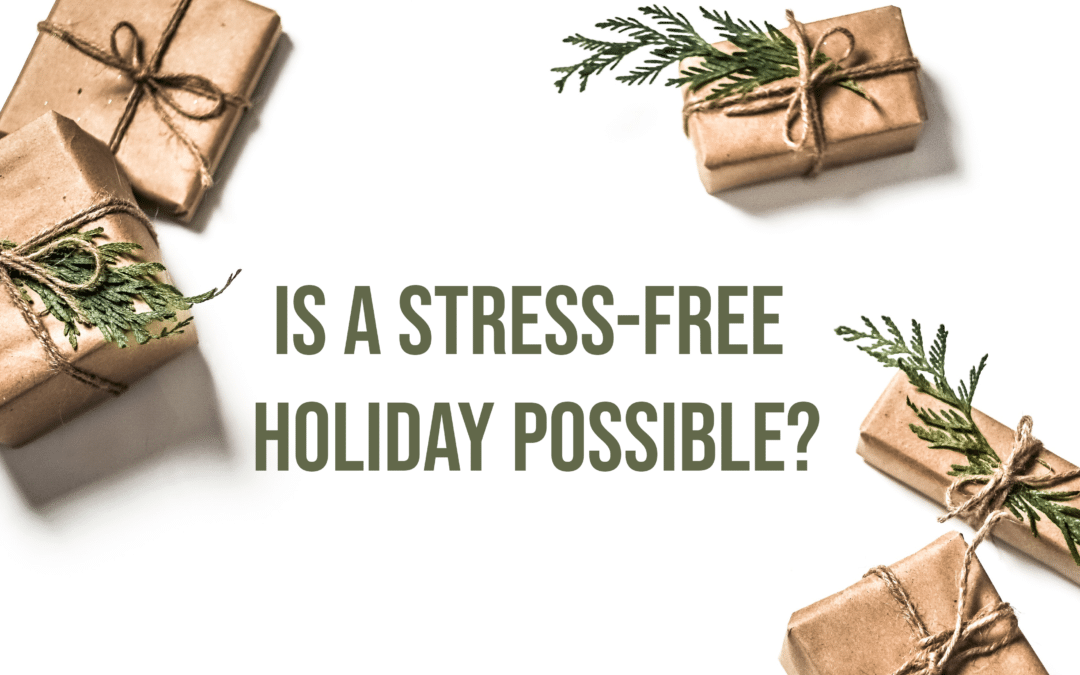When you think of a stereotypical holiday, you most likely think of good food, parties, surrounded by family and friends. That might be true for you or people around you, but the holidays can also dredge up some negative feelings. Whether it’s because of estrangement, trauma, physical ailments, toxic positivity, the holidays may not be the most jolly time of year. In fact, according to a poll conducted on verywellmind.com, more than 80% of us find the holiday season to be ‘somewhat’ or ‘very’ stressful—that ranks navigating the holidays right up there with asking for a raise! What is it that has us all so hot and bothered?
Doing Too Much
All things in moderation, as the saying goes. The problem with the holiday season is that we often experience too much of a good thing. While stress itself is necessary for our survival and zest for life (researchers call this positive type of stress “eustress“), too much stress has a negative impact on our health, both mental and physical. Too many activities, even if they are fun activities, can culminate in too much holiday stress and leave us feeling frazzled, rather than fulfilled.
Too Much Togetherness
The holidays are a time when extended families tend to gather. While this can be a wonderful thing, even the most close-knit families can overdose on togetherness, making it hard for family members to maintain a healthy balance between bonding and alone time. Many families also have roles that each member falls into that have more to do with who individuals used to be rather than who they are today, which can sometimes bring more dread than love to these gatherings.

Not Enough Togetherness
This can be a tough time for many people, especially those who have lost partners or parents, as it reminds them of their loneliness. As the world seems to be gathering with family, those who rely more on friends for support can feel deserted and alone.
Seasonal Affective Disorder (SAD)
An often unrecognized problem that comes with the holiday season is actually a by-product of the seasons changing from fall to winter. As daylight diminishes and the weather causes many of us to spend more time indoors, many people are affected to some degree by a type of depression known as seasonal affective disorder.1 It’s a subtle but very real condition that can cast a pall over the whole season and be a source of stress and unhappiness during a time that people expect to feel just the opposite.
The great thing about holiday stress is that it’s predictable. Unlike many other types of negative stress we encounter in life, we know when holiday stress will begin and end, and we can make plans to reduce the amount of stress we experience and the negative impact it has on us.
Here are some tips you can try to help reduce holiday stress before it begins so that it remains at a positive level, rather than an overwhelming one.
Set Your Priorities
Before you get overwhelmed by too many activities, it’s important to decide what traditions offer the most positive impact and eliminate superfluous activities. For example, if you usually become overwhelmed by a flurry of baking, caroling, shopping, sending cards, visiting relatives and other activities that leave you exhausted by January, you may want to examine your priorities, pick a few favorite activities and really enjoy them, while skipping the rest.
Take Shortcuts
If you can’t fathom the idea of skipping out on sending cards, baking, seeing people, and doing all of the stuff that usually runs you ragged, you may do better including all of these activities in your schedule, but on a smaller scale.
Send cards, for example, but only to those with whom you maintain regular communication. Or, don’t include a personal note or letter in each one. Find a way to simplify. The same goes for baking—will anyone be enraged if you buy baked goods from the bakery instead? If you find ways to cut corners or tone down the activities that are important to you and your family, you may enjoy them much more.

Change Your Expectations for Togetherness
With family and friends, it’s important to be aware of your limitations. Think back to previous years and try to pinpoint how much togetherness you and your family can take before feeling negative stress. Can you limit the number of parties you attend or throw or the time you spend at each? Can you limit your time with family to a smaller timeframe that will still feel special and joyous, without draining you?
When dealing with difficult relatives, it’s okay to set limits on what you are and are not willing to do, including forgoing your visits or limiting them to every other year.
For those who experience loneliness during the holidays, consider inviting a group of friends to your home. If virtually everyone you know is with family during the holidays, you might consider volunteering to help those less fortunate than yourself. Many people report these experiences to be extremely fulfilling, and your focus will be on what you have rather than what you lack.
Host Celebrations at Your House
If the stress of traveling each year is more than you’d like to handle, you may want to have family over to your home for the holidays. This is also a good solution when you have too many groups or relatives to take turns seeing: invite everyone to celebrate together, and you will get to see everyone more often.
Be Prepared for Some Conflict
If you usually have conflict when you get together with your family, it’s a good idea to be prepared for it. I’m not suggesting that you go looking for trouble, but rather, approach the situation with a sense of realism. If your mother always criticizes your appearance or your brother always makes rude jokes, don’t expect them to change their habits; just aim to have a sense of humor about it and remind yourself what you love about them.
Just Say No to It All
If seeing family causes you great amounts of stress each year, it’s okay to say no sometimes. Celebrating with just your partner or kids can be a wonderful alternative to seeing people who make you feel consistently stressed.
Surround Yourself With Friends
Many a happy holiday has been formed by groups of people who have decided to celebrate with friends instead of family. Whether you’re unable to travel (or have family who is), or for some other reason find yourself without kin, celebrating with other people you know who are also without family for the day can be a great way to bond with friends and enjoy the spirit of the season.
The holidays are often a time when we focus on others, by sending cards, buying gifts, and cooking food, but during high-stress times, it is more important than ever to find time for you. If you know that the holidays are going to be stressful, plan accordingly and make sure you are scheduling some “me” time and carving out time for self-care.


